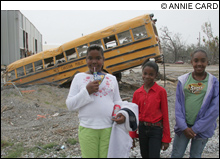
A WORLD TURNED UPSIDE: DOWN Ten-year-old Mallery Hill (middle), pictured with two cousins, survived the flood waters by living with her father, Willie, on rooftops that kept collapsing — three in all. MHA is helping the family rebuild. |
Ever wonder what became of all the tax dollars and personal donations you sent to the Gulf Coast over the past year in the wake of Hurricane Katrina? No one can provide a full accounting, of course. But BU graduate and Peterborough, New Hampshire, resident Annie Card is in a unique position to etch out the big picture. A year ago, the freelance photographer was living comfortably in a leafy corner of the Northeast. Today, Card, 44, is running a nonprofit she co-founded called Mississippi Home Again (MHA). In the process, she has inadvertently created a new model of disaster relief.Much of the most-effective rebuilding has been done by churches, who can command both funding and volunteer help from within their own denominations, as well as by faith-based organizations such as Habitat for Humanity. But the larger relief organizations, along with the government, have been peculiarly bogged down.
That may be about to change, however, as the big boys are beginning to take their cues from small outfits like MHA.
A wasted windfall
Like New Yorkers during the dizzying days that followed September 11, Gulf Coast residents afflicted by Hurricane Katrina were united by tragedy, connected by loss, and convinced that the country would come to their rescue. The destruction, horror, and trauma of Katrina - the costliest and deadliest natural disaster in the history of the United States - bound people together, as the government blew it on every level. As Americans watched the political, economic, and human disaster unfold on television, aghast at its sheer scale, they poured millions of dollars into private relief agencies, while untold numbers of volunteers dropped everything to assist in the distribution of life-sustaining aid.
Among them was Card. Six weeks after Katrina made landfall last August 29, she found herself in Pass Christian, Mississippi, about 70 miles east of New Orleans, surrounded by desperate strangers and frantically passing out food on the back of a Red Cross truck.
“Back then,” she says, “people still had a certain energy, a survivor adrenaline. It was a lovefest down here. There were a lot of high hopes, a lot of promises.” But those promises were broken, says Card, “so much so that people lost hope.”
As Card doled out food, she talked with people, asking them how they were really living. “You think that people are going to be tired of telling their story. But the reality is they can’t tell their story enough.” Before long, survivors invited Card into their homes, revealing a level of destruction that Card hadn’t anticipated. Houses that looked okay from the outside were ruined inside, barely habitable. No walls, no beds, no appliances. Mold and mud everywhere. People sleeping on cement floors, once covered by rugs, now covered in plastic. Extended families sharing one or two rooms. “Forget creature comforts,” Card says. “People were living in tents in their front yards.”